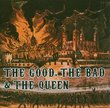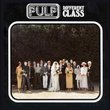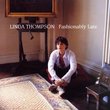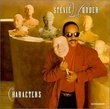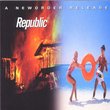| All Artists: Pulp Title: We Love Life Members Wishing: 1 Total Copies: 0 Label: Sanctuary Records Release Date: 8/20/2002 Genres: Alternative Rock, Pop, Rock Style: British Alternative Number of Discs: 1 SwapaCD Credits: 1 UPCs: 021823000527, 060768320420 |
Search - Pulp :: We Love Life
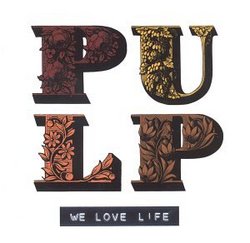 | Pulp We Love Life Genres: Alternative Rock, Pop, Rock
We Love Life-produced by Scott Walker--is best thought of as the calm after the storm. Pulp's previous album, 1997's This Is Hardcore, was the kind of record often made by intelligent and sensitive people who become ... more » |
Larger Image |
CD DetailsSynopsis
Amazon.com We Love Life-produced by Scott Walker--is best thought of as the calm after the storm. Pulp's previous album, 1997's This Is Hardcore, was the kind of record often made by intelligent and sensitive people who become famous after a lifetime assuming that being famous was what they wanted. Like Radiohead's The Bends, Elvis Costello's This Year's Model , Nirvana's In Utero, or most of the solo albums of Scott Walker, Hardcore is twitchy, disgusted, nauseous, and distinctly uneasy listening. In contrast, We Love Life is the most musically benign album Pulp have been responsible for, emphasizing a fondness for string arrangements and gently building melodies that have only been intermittently discernible before. There is no blunting of the edge in Jarvis Cocker's voice or words, even if he seems less concerned with himself than previously; indeed, the opening track "Weeds" seems a touching and courageous hymn of admiration to asylum seekers. --Andrew Mueller Similarly Requested CDs
|
CD ReviewsA classic album whose recording will go down in history! 29-year old wallflower | West Lafayette, IN | 08/24/2002 (5 out of 5 stars) "In England, Pulp is known as the little band that could. After more than a decade of hard work & obscurity, they finally caught the public's attention with 1992's SEPARATIONS, coming at the start of the Britpop explosion Pulp helped gave birth to. Their subsequent albums were shining examples of the trend, but with leader Jarvis Cocker's highly original & biting lyrics to counter the infectious melodies. While bands like Oasis & the Verve relished in the excess that success brought them (and subsequently imploded), Jarvis wasn't impressed by it all, as albums like 1998's extremely dark THIS IS HARDCORE proved.That album was an all-around stunner & one that following up would seem like a challenge. It sure turned out to be, for WE LOVE LIFE had originally been recorded (and almost completed) with producer Chris Thomas, famous for his work with artists like Elton John. At the last minute, Jarvis wasn't happy with the result & immediately returned to the studio to start from scratch. This time, the man in the producer's chair would be American-born British cult icon Scott Walker. As it turned out, Jarvis' change of heart was warranted, as WE LOVE LIFE manages to overtake even HARDCORE's genius & with a much lighter mood.At first, the marriage between Jarvis' literate lyrics & Scott's Phil Spector-inspired production techniques would seem like an odd one, but as I kept hearing in the year after WE LOVE LIFE's European release, it worked surprisingly well. As songs like the 8-minute epic "Wickerman" prove, it sure did. The near-whispered vocals & alternately lush & dissonant music make for a spellbinding listening experience. I can just imagine Scott Walker's distinctive baritone singing a song like this.But a title like WE LOVE LIFE indicates a much brighter affair than THIS IS HARDCORE & in some ways it is, with Scott's expansive production giving the songs room to move & definitely easier to listen to. The near-title track "I Love Life" is one that could have been released back in Britpop's heyday & easily become a hit & is the most obvious example of Jarvis' mellowing out without dulling his edge. "Bob Lind" (remember him from "Elusive Butterfly"?) has Jarvis regaining his dark humor for a song that looks at a musician long after his heyday has passed. Hopefully, Jarvis isn't prediciting his own fate, for I believe he still has a lot to say. On the other hand, songs like "Bad Cover Version" (which even features a subtle dig at Scott Walker himself!), "The Night That Minnie Temperley Died" & "Roadkill" are some of the most downbeat & shocking lyrics Jarvis has ever written, proving that the production may be bright, but the words can still darken.While Jarvis still has some bones to pick in his lyrics, WE LOVE LIFE has hints of him finding some sense of peace, as evidenced by the nature theme of some songs. "Weeds", "Weeds II", "The Trees", "The Birds In Your Garden" (an actual love song!) & "Sunrise" have Jarvis seeing both the comfort & uncertainty nature & civilization bring. Again, Scott Walker's production is enough to warrant equal billing on the cover, but it doesn't result in Pulp simply singing on a Scott Walker album.WE LOVE LIFE's recording history is certainly a twisted one, but that doesn't compare to its releasing. It came out in Europe in October of 2001, but nothing planned for an American release. I first heard in April of 2002, but then it kept being pushed back a month (distribution problems, I believe) & I wondered if it would ever come out in the U.S. at all. Well, it's here finally & I must say it's every bit of a tour de force. For a band that's been around for as long as Pulp has (more than 2 decades), such a classic would seem unlikely that late in their career. Yet it's worked for both Pulp & Scott Walker, who really ought to come out of the darkness & record more often. Scott has had an influence on singers like David Bowie, Nick Cave & even Jarvis Cocker himself, so let's hope an album like WE LOVE LIFE will help alert people not just to Pulp's talents, but Scott's as well & maybe even result in some recognition in his own right. There's no better time for it than now." The new PULP sensation Gianni | Rome, Italy | 08/23/2002 (5 out of 5 stars) "Beginning with a dash of introspective, pretentious and introvert albums (It, Freaks, Separations), delivering the explosion of their pure Pop soul on His'n'Hers and the brilliant Different Class, passing through sofisticated, pompous and dark-decadent expressionism of This is Hardcore, 'Jarvis Cocker and his guys' have recently bloomed into their ripening opera: We Love Life. This 12 songs collection is a clear demonstration of the great pop music writing and playing ability of the band from Sheffield: a simply outlined instrumental carpet and the direct words of Cockers perfectly capture a mood of consciousness about their new vision of life. No more twisted between the research of an astonishing arrangement of sounds and breathtaking lyric sceneries, which absolutely made their effect and mean in the past years, We Love Life represents the culmination of PULP's excellent Pop career: caught, as usual, between their 'sex painted' souls (always recalled by Cocker's wry and marvellous lyrics) and the agening process of their music sensibility. The Album starts with Weeds, a modern and for more sensitive and careful listener version of Mis-shapes, that pounds on the Jarvis frequent anguish about the British classes differentiations. Then Jarvis starts singing his way.... With The Night That Minnie Timperly Died, that will likely become a single and whose subject is clearly disclosed by the title, Cocker begins his vocal trills that make PULP music so different and weird: Oh, Minnie I can feel the pain. Oh, Minnie I can feel the pain, pain, pain, pain. ...And the Album unfolds hits core with The Trees, Wickerman, I Love Life, Birds In Your Garden, Bob Lind and Bad Cover Version: the pieces that will probably mostly remain in the fans minds. In none of these songs PULP seem to be aggressive against the listener, with a new way to face the musical and Lyrics contents: a softener one, a simplier one and more communicative one. With Jarvis hanging onto his vocal ability to share with everyone who's listening his new maturity, his new personal redemption. Roadkill and Sunrise close the album, a kind of sweet and fair closing scenery to the ones who saw the highlights minutes before. Maybe the album never take off, but once you've listened you've acquired the new PULP sensation: new ways, new reasons to Love Life...wiping away the 'hollow feeling' of past times." Deceptively Pastoral zenmunster | Seattle, WA | 09/22/2003 (5 out of 5 stars) "I disliked 'We Love Life' the first time I listened to the album. I missed the old Pulp. I really hated "The Trees." The album was relegated to collecting dust. On a whim, I popped the album in a few months later and was blown away. We Love Life is a sublime listening experience - and easily worth 5 stars (and not many albums are...). Jarvis's lyrics are subtle and just as clever as before - but you have to listen. The high point of the album is the spralling and beautiful "Wickerman." This album is the best of 2001 and 2002. Treat yourself to what may be the last Pulp album."
|

 Track Listings (13) - Disc #1
Track Listings (13) - Disc #1